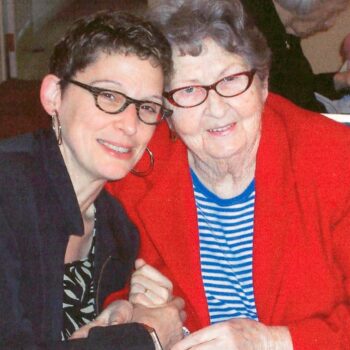Lisa B. Capp

Deep down, we all live with some level of fear about our future. Fearing that a loved one may be diagnosed with a debilitating disease and that eventually, we may receive the same diagnosis, is one example. When we find ourselves facing a terminal brain disease that slowly steals treasured memories, moving on is difficult.
March 22nd, 2018
Lisa B. Capp is a blogger, activist and former dementia caregiver who lost her mother to dementia after caring for her for 18 years. As a high tech change consultant, Lisa worked with leaders of global business, governments and non-profits. Her passion for empowering strength through transition in her professional work is now focused on those living a care partner life.
Deep down, we all live with some level of fear about our future. Fearing that a loved one may be diagnosed with a debilitating disease and that eventually, we may receive the same diagnosis, is one example. When a loved one receives this type of diagnosis, we hope to find strength in moving gracefully from denial to acceptance.
However, when we find ourselves facing a terminal brain disease that slowly steals treasured memories, moving on is difficult. The early phases of dementia take a tremendous toll on relationships before and after diagnosis.
It was the mid-’90s when my mother, Vera Cappelletti, preoccupied and sitting across from me, first brought up Alzheimer’s. As she turned a green-and-gold box over and over in her hands, she softly said, “I get lost driving around town, now.” I laughed uncomfortably and responded, maybe too quickly. “Me too, Mom. It happens all the time when I’m traveling for work.” She pushed the box closer to me and I saw the logo: Namenda, a cognition-enhancing medication, given to patients before Aricept became routinely prescribed. “I went to the doctor and he prescribed this. It’s for Alzheimer’s. Do you think I’m losing my mind?”
Selfishly, my first thoughts were of a simpler time, when my father was alive to support her. Those days were gone. And I feared I wouldn’t be able to play the part of parent to my mother—the one providing care.
I held her gaze, knowing that although she was forgetful, that she repeated stories and that she blared the television volume at levels that drove most from the room, she was still my mother, and she was waiting for my response. But it was like the word Alzheimer’s had paralyzed my thought process. Finally, I asked, “Do you think it’s time for us to get help, Mom?” Her shoulders slumped and I knew, in that moment, I failed her. But, I also knew that this time, we couldn’t pretend this was just forgetfulness; we couldn’t make Alzheimer’s go away.
When it’s time to face transitional points in a loved one’s cognitive health, simple lessons I learned the hard way may help you. If you and your loved one haven’t yet done any preplanning, ask simple and open-ended questions about how your loved one feels. It’s best to sit close. Attempt some physical contact (holding hands or a hug) and speak in a supportive tone of voice. Help your loved one to feel safe in disclosing what they are experiencing. Listen more than you speak. Give your loved one time to find their own words to describe what they feel and what they fear. Don’t try to fill the silent pauses. Avoid judging what your loved one says or trying to convince them differently. For this discussion, enter their reality and stay there, no matter how absurd or irrational what’s said may feel to you. Your loved one may feel overwhelmed by having too many people present in initial conversations. It’s a good time to allow the family member most trusted by your loved one to take the lead in these dialogues. There’ll be plenty of opportunity for family members to engage in other care later.
If you don’t find yourself in crisis and have time for preplanning, consider recommending baseline cognitive tests to your loved one as a precaution. You could offer to take the test together. Starting early can open a dialogue and help to prepare for any outcome. Allow these difficult conversations to empower you and your loved one to identify and take control of those things that you can prepare for. Having time before a crisis will allow you to put in place the necessary legal and guardianship documents with the thoughtful consideration of all parties and ensuring your loved one’s wishes will be honored.
Read more stories like Lisa’s here.